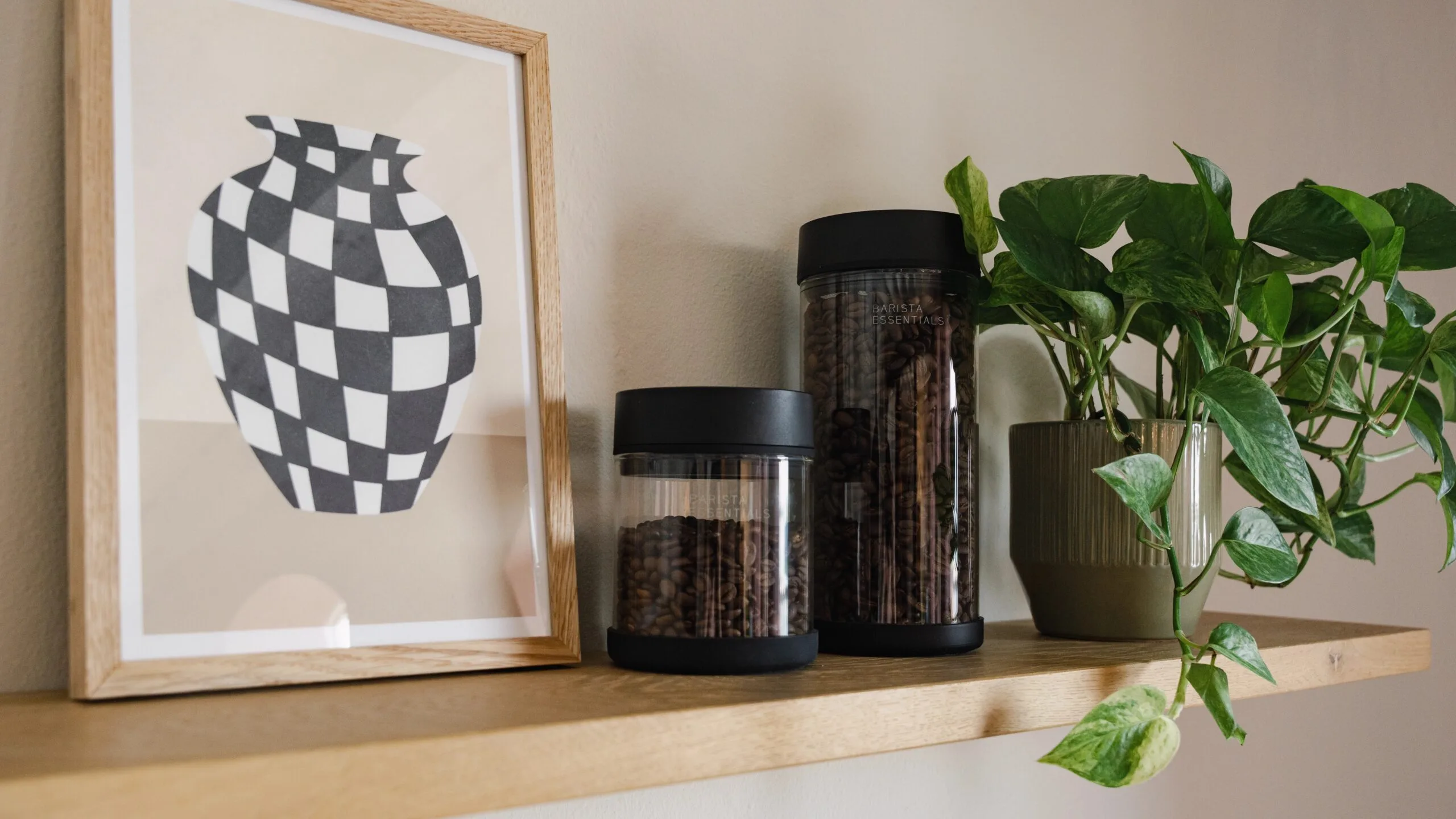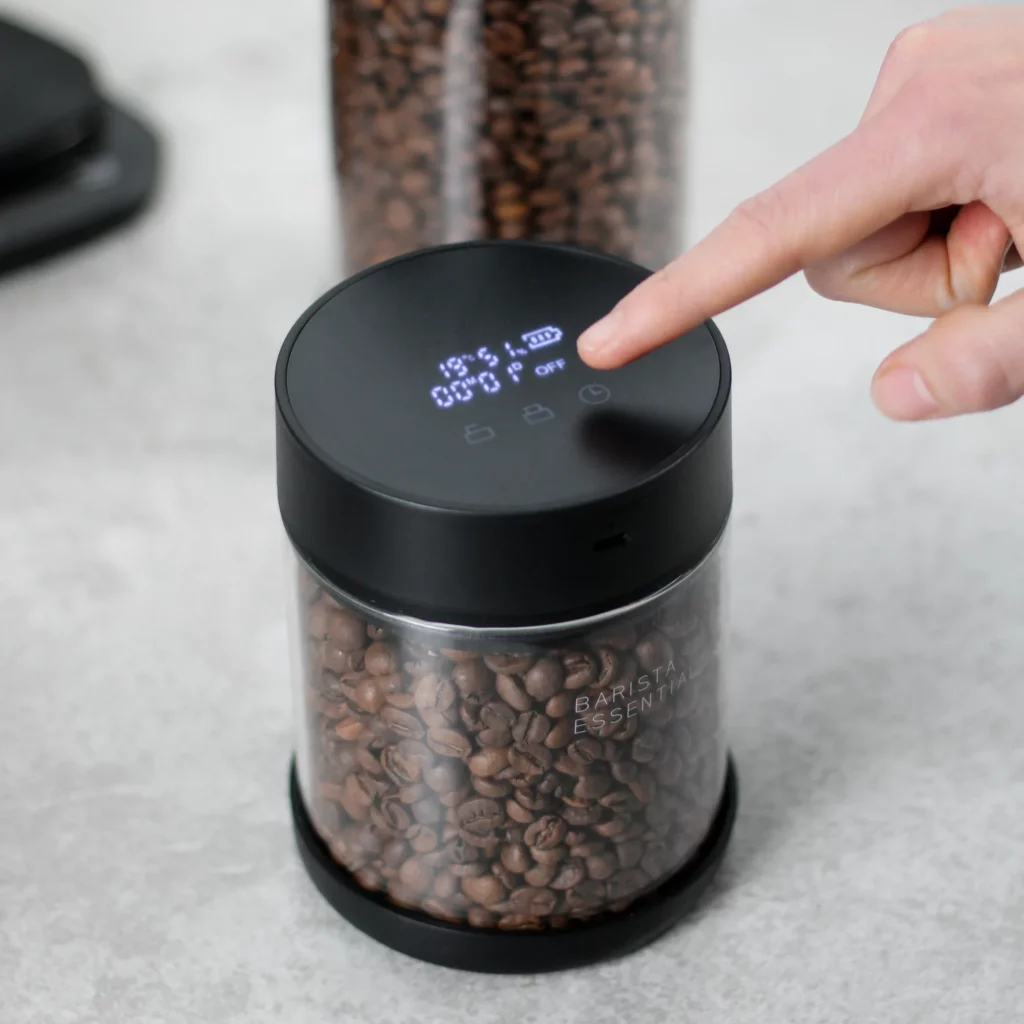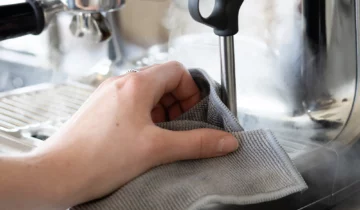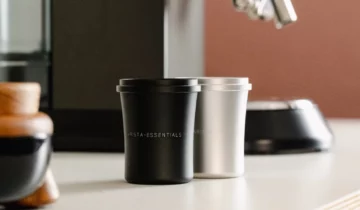Good coffee starts with using fresh beans. But how do you store your coffee beans properly to keep them that way?
Below, we answer the most frequently asked questions about storing coffee beans, so you can enjoy fresh beans for as long as possible.
Inhoudsopgave
Storing coffee beans
Want your coffee to always taste fresh and delicious? Then it’s important to think carefully about storing your coffee beans.
A convenient way to do this is by using a vacuum canister. It removes the air from the container, so no oxygen can reach your beans.
This keeps them fresher for longer and helps preserve their flavor.
Aside from using a vacuum container, here are a few more helpful tips for storing coffee beans:
- Only grind right before brewing: ground coffee loses its flavor quickly. So just grind what you need at that moment and keep the rest of your beans whole.
Store your coffee canister in a dark place. This is because light causes coffee beans to age faster
Airtight coffee container (with automatic vacuum)
Common mistakes when storing coffee beans
- Storing in the original (opened) packaging
- Keeping them in a warm spot
- Storing coffee beans in the fridge
- Grinding too much coffee at once
- Keeping them (too long) past the expiration date
How long do coffee beans last?
How long your coffee beans stay fresh depends on a few factors: light, air, temperature, and moisture.
Beans you buy directly from a coffee roaster usually come in a special bag with a one-way valve. This lets air out, but not back in. If stored in a cool, dry, and dark place, those beans can stay good for up to 6 months.
Still, we recommend using your beans within 2 months of the roast date. That’s when they taste their best.
Once you open the packaging, the quality of the beans starts to gradually decline. For the best flavor, try to use the beans within 3 to 5 weeks of opening the packaging.
Got your beans from the supermarket? They’re often a bit older by the time they reach your kitchen. Always check for the roast date (if listed), and make sure to store them in an airtight coffee container.
High-quality coffee beans always include a roast date. And there are a few more signs of good, fresh coffee. Read more here about how to recognize the best coffee beans.
How long does ground coffee last?
Ground coffee loses its flavor faster than whole beans. That’s because coffee grounds have more contact with air, light, and moisture.
If you have an unopened, vacuum-sealed bag of ground coffee, you can usually store it for up to 12 months, as long as it’s kept cool and dry.
Once opened, the quality starts to decline. For the best taste, use an opened pack of ground coffee within 2 weeks.
Attention: Not all vacuum canisters are suitable for storing ground coffee. This is because ground coffee can clog the vacuum pump. Always make sure you check if the canister you want to use is suitable for ground coffee.
Should you keep coffee in the fridge?
You should not store coffee beans in the fridge. This is because fridges are humid and coffee beans easily absorb moisture and odors.
Coffee beans are hygroscopic: meaning they quickly take in moisture and smells from their surroundings. This can give your beans a musty taste or even cause mold if you keep them in the fridge.
On top of that, opening and closing the fridge creates temperature changes, which leads to condensation. Those tiny droplets on or inside the packaging can affect the quality of your beans.
Can you freeze coffee beans?
Freezing coffee beans is possible, but only under certain conditions.
Storing coffee beans in the freezer be useful if you have a large supply of beans that you won’t use within a few weeks.
If you choose to freeze your beans, keep the following in mind:
Seal airtight: Use a vacuum or freezer bag to prevent moisture and freezer odors from getting into your coffee beans.
Don’t refreeze: Only take out the amount of coffee you need, and leave the rest frozen.
Let the beans get to room temperature slowly: Take them out of the freezer and let them warm up gradually before opening the bag, to avoid condensation.
Do coffee beans go bad?
Coffee beans can absolutely go bad.
But that doesn’t mean you should throw them away the day they hit their expiry date.
If you’ve stored your coffee beans properly, you can still use them after this date. They won’t suddenly be bad, but the flavor might be a little less vibrant due to their age.
Use your senses to check if your coffee beans are still good:
Smell the beans: do they smell musty or odd? Then you should probably not use them.
Look for mold or discoloration: if you spot any, throw out the beans.
Taste: does your coffee taste flat or unpleasantly bitter? Then the beans have probably passed their prime.
How long do coffee beans last?
Beans* sealed packaging | 6 months |
Beans open packaging | 3 to 5 weeks |
Ground, vacuum sealed | 12 months |
Ground, opened | 2 weeks |
Cups | 12 months |
Instant coffee | Years |
Once brewed | 24 hours |
* Beans from a roaster. For supermarket beans, look for a roast date and add 6 months. That’s roughly the same as the best-before date
Conclusion
Want your coffee to always taste great? Then proper storage of your beans is key.
Here are the most important things to remember about storing coffee beans:
Store coffee beans airtight, preferably in a vacuum canister. This keeps them fresh longer.
Grind only right before brewing, otherwise, you’ll lose flavor quickly.
Use opened beans within 3 to 5 weeks. Ground coffee within 2 weeks.
Best-before date passed? Still fine, as long as the coffee smells and looks good.
By following these tips, you’ll ace your coffee bean storage and keep your beans fresh for as long as possible.






 No products in the cart.
No products in the cart.